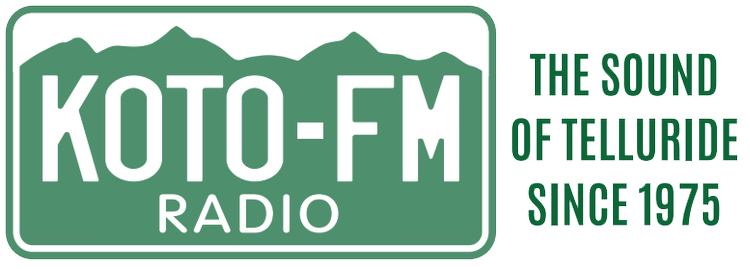By Matt Hoisch
Fifth-grader Nico Cubero García (1st place) and fourth-grader Emma Dominguez de la Torre (2nd place) pose with announcer Vincente Artes Usero after winning the Telluride Intermediate School’s Spanish Spelling Bee. Image by Julie Bain
It’s a blustery winter afternoon with flurries of snow in the air. But inside the Palm Theater, excitement fills the room. Students from Tellruide Intermediate School pack the venue, gathering for a spelling bee. On stage, 11 competitors ranging from third to seventh grade sit in folding chairs, nervously fidgeting and waiting to begin. But there’s one catch: the students aren’t spelling words in English, but in Spanish.
Fifth grade teacher Zoe Gillett kicks off the annual Spanish Spelling Bee.
“¡Bienvenidos y bienvenidas! Welcome!” she says to the students. “¿Cómo están?”
“¡Bien!” they respond.
“Listos?” she asks.
They answer with an enthusiastic “¡Si!”
“Muy bien,” says Gillett. “Everybody ready to start?”
Not only are the students spelling Spanish words, but most of the competition is conducted in Spanish. The students competing are from the school’s Dual Immersion Program, which gives students the option to learn their subjects in Spanish from kindergarten to fifth grade.
Telluride Intermediate has held the Spanish Spelling Bee for several years and has produced state and national champions.
Third grade teacher Susana Garcia Fernandez has been organizing the Bee for many of those years. She says she appreciates the power of a little friendly competition.
“I truly believe that spelling—the competition of knowing words, how to spell it—it’s something that drives many kids to get better at it,” she says.
According to Garcia Fernandez, many of the students are already good Spanish spellers because of the Dual Immersion Program. She notes the program includes both kids that speak Spanish at home and those who don’t.
“They know some of the patterns, they know some of the structures ,” Garcia Fernandez says. “So if they are good students, they know already how to spell many words.”
But even she admits a lot of the words in the competition are hard. She reads from a list of words that the students study from.
‘Ambivalencia.’ That one is hard because in Spanish we pronounce the ‘b’ and the ‘v’ the same way. ‘Abuhardillado‘ because it has an ‘h’ in the middle and remember in Spanish we don’t say the ‘h.’” She reads one more example. “So this one is not as hard as it looks but it’s super long: ‘Clorofluorocarbono.’”
Fourth grade teacher Vincente Artes Usero, or Mr. V, is the voice of the Bee. He pronounces the words for each contestant.
“Tu palabra es ‘Mejorado,’” he says to one contestant.
“Tu palabra es ‘Leotardo,’” he says to another contestant.
“Tu palabra es ‘Trazo,’” he announces to a third contestant.
Artes Usero says the competition is a great opportunity for the students to practice their Spanish skills.
“It gives the language that immensity,” he notes. “If you know how to spell properly, you how to write. But first of all you need to know and learn how to speak.
There is indeed an immensity to the competition. Like any spelling bee, there are jubilant cheers for correctly spelled words and somber sighs after the bell that signals an incorrectly spelled word. But sportsmanship is all around, with high fives and cheers for all the spellers—whether they get the words right or wrong.
Out of the 11 contestants, fourth-grader Emma comes in second.
“It’s my first time in the Spanish Spelling Bee,” she says, noting that it felt “really good” to come in second.
KOTO couldn’t reach the first place winner, fifth-grader Nico, immediately after the competition. But, in an email statement, he says, “I felt great, very happy. I feel very proud of going to the state competition and represent our school.”
Students from the Telluride Spanish Spelling Bee will now move on to the State Spanish Spelling Bee. That will take place in Boulder this spring. Colorado will also host the National Spanish Spelling Bee in Denver this summer.

